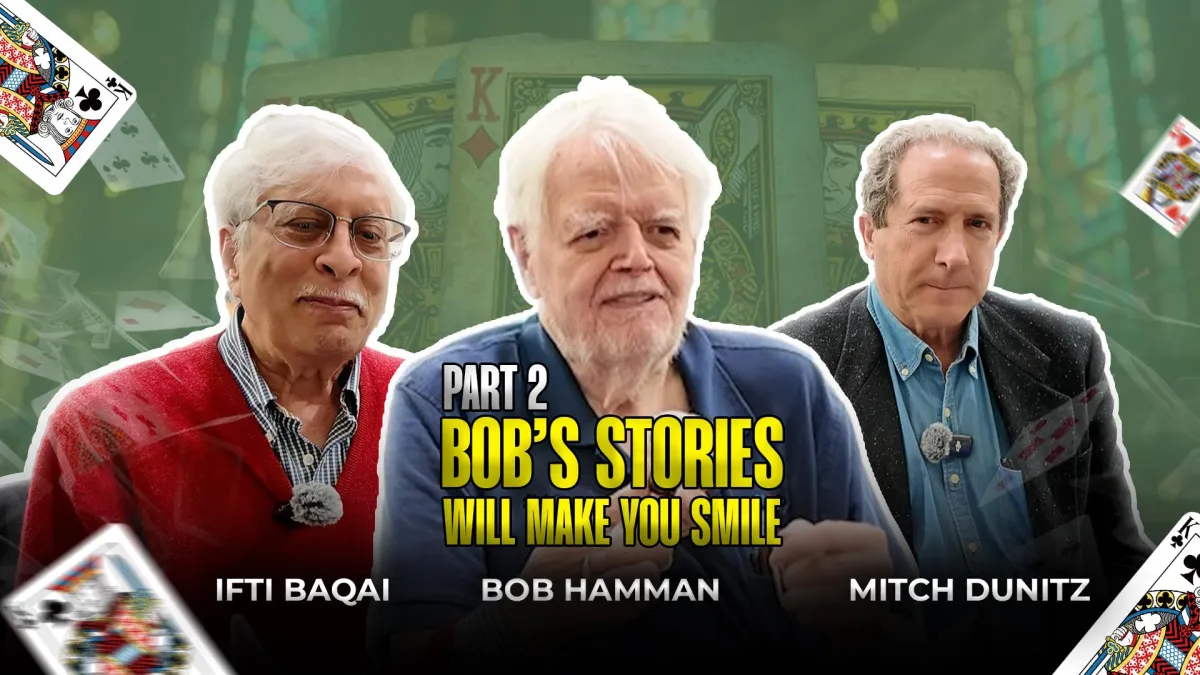
A Conversation with Bob Hamman: Bridge Stories, Mind Games, and the Future of the Game
Bridge is more than just a card game; it is a rich tradition filled with strategy, camaraderie, and mental challenge. In a recent engaging conversation with Bob, a legendary figure in the bridge community, we delve into his memorable stories, insights on the challenges facing bridge today, and his hopeful vision for the future of the game. This blog post captures the essence of that conversation, highlighting key points and lessons from Bob’s decades-long experience.
Introduction: Meet Bob, a Bridge Icon
Bob is a well-known and respected player in the bridge world, famous not only for his expertise but also for his colorful anecdotes and deep love for the game. Over the years, Bob has become a bridge icon, known to players across the globe. His stories bring to life the unique culture of bridge, blending humor, strategy, and human nature.
In this conversation, Bob shares his perspective on the current state of bridge, the mental and social benefits of the game, and the efforts underway to attract younger players to ensure the game’s survival.
The Biggest Challenge: Attracting Young Recreational Players
One of the most pressing issues Bob highlights is the shortage of young recreational players. While there are some expert young players, the game struggles to attract a broad base of younger enthusiasts who play for fun and social connection.
Bob explains that this gap threatens the future of bridge. Unlike past generations, who grew up playing cards during tougher economic times, today’s youth have many alternative entertainment options such as video games, online poker, and internet surfing. Additionally, there is a widespread perception that bridge is a game for older people, which further discourages younger players from joining.
The Unique Mental and Social Benefits of Bridge
Bob emphasizes that bridge is not just a game of skill but also a powerful mind game that teaches valuable life skills:
Dealing with Adversity: Bridge players learn to face setbacks and keep persevering.
Critical Self-Review: The game encourages players to review their decisions objectively and improve.
Mental Agility: Unlike chess, where skill differences create large score gaps, bridge allows for more variability. This means that even less skilled players can occasionally beat stronger opponents, keeping the game exciting and competitive.
Moreover, bridge’s social aspect sets it apart from other mind games like chess. While chess is typically a solitary competition, bridge is inherently social, played in partnerships and groups. This social element makes bridge appealing across all age groups and adds a layer of enjoyment beyond just winning.
Memorable Stories and Humor from the Bridge Table
Bob’s stories bring the bridge community to life. For example, he recalls a humorous birthday gift from a friend—a personalized license plate reading “IBL8” (I’ll be late)—a playful jab that reflects the camaraderie and fun in the bridge world.
He also shares tales of colorful personalities and moments, such as a match where baseball players, given a time advantage to view cards, surprisingly defeated a team of bridge experts. These anecdotes illustrate the unpredictable and lively nature of bridge.
One memorable story involves a playful bit of gamesmanship where Bob pulled out a jack of spades from his pocket during a match to tease an opponent, showing the lighthearted spirit that often accompanies serious competition.
Advice for Players: The Importance of a Short Memory
For players looking to improve, Bob offers a simple but profound piece of advice:
“Move on to the next 13 cards and leave the past behind.”
This means focusing on the current hand and not dwelling on mistakes or bad outcomes from previous hands. Having a short memory helps maintain concentration and reduces frustration, which is crucial for consistent performance.
Modern Bridge Tournaments: Balancing Competition and Social Life
Bob notes that modern bridge tournaments have evolved to have more reasonable schedules, such as starting at 10 AM and finishing by 3 PM. This allows players to enjoy social activities like dinners with friends and still get adequate rest, making the experience more enjoyable and sustainable.
This balance between competition and social interaction is a key factor in bridge’s appeal and something that organizers continue to emphasize.
Mentoring the Next Generation: Ensuring Bridge’s Survival
To address the challenge of attracting younger players, Bob and his colleagues have been involved in mentoring programs for over a decade. These programs focus on college-age players, teaching them online once or twice a week.
The goal is not necessarily to create top-level professionals but to foster a love for the game among young people who enjoy the social and mental aspects of bridge. By engaging players while their brains are sharp and habits are forming, these efforts aim to build a sustainable future for bridge.
Conclusion: A Hopeful Outlook for Bridge
Bob’s conversation is a treasure trove of insights, humor, and wisdom. While bridge faces challenges, especially in attracting younger recreational players, the game’s unique blend of mental challenge and social connection offers a strong foundation for growth.
With ongoing mentoring programs, modernized tournament formats, and a renewed focus on promoting bridge as a vibrant, inclusive game, there is hope that bridge will continue to thrive for generations to come.
Call to Action: Join the Bridge Community
Whether you are a seasoned player or new to the game, bridge offers a rewarding experience that sharpens the mind and builds lasting friendships. Consider joining a local club, participating in online games, or getting involved in mentoring programs to help keep this timeless game alive and flourishing.
